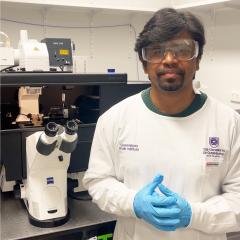Congratulations to the three SBMS academic staff members who were awarded grants for 2016 under the UQ Early Career Researcher (ECR) Grants Scheme.
ECR Grants are highly contested across the University and are awarded primarily on the merit of the proposed project.
Innovative, risk-taking research is encouraged, provided the research design is rigorous and shows promise of being well-executed.
Projects should be evidenced by a well-designed research program investigating a significant problem or major issue in the theory or practice of a discipline, or a research program aiming toward the development of new knowledge in the area, fundamental or applied.
The three SBMS grant recipients are:
 Dr Kirsty Short
Dr Kirsty Short
The role of HMGB1 in the severity of influenza virus infection in asthmatic individuals: clinical studies identify asthma as an important susceptibility factor for the development of severe respiratory disease following infection with influenza virus. However, the mechanisms that cause this increased susceptibility remain unclear. We aim to understand the role of high mobility group box-1 and different influenza strains in the susceptibility of asthmatics to influenza pneumonia. This study may thus help identify novel therapeutic targets to treat influenza virus pneumonia in asthmatic patients.
 Dr Christian Gruber
Dr Christian Gruber
Circular plant peptides as novel modulators of insect immunity: the biological function of plant compounds if often unclear, but they may target physiological processes involved in predator devitalization. We previously isolated widely distributed circular plant peptides (called cyclotides) that suppress immune cell proliferation in human cells. In this project we will determine the ability of these peptides to modulate immunity in insects, allowing (i) elucidating their role in herbivore defense as well as (ii) utilizing the insect model system to guide translational approaches to study immunomodulatory mechanisms of these peptides as treatment for autoimmune diseases.
 Dr Alice McGovern
Dr Alice McGovern
Profiling single cell transcriptomes: novel insights into sensory neuron regulation of respiratory function in health and disease:the respiratory system is supplied by different types of sensory neurons that play an essential role in protecting the airways from potentially damaging stimuli through initiating reflex or behavioural changes in respiratory function. In the diseased airways, dysfunction of these sensory neurons is thought to underpin altered sensations and responses arising from airways. Accordingly, it is of immense interest to understand the neurobiology of these sensory pathways. These respiratory sensory neurons are made up of many different cell types that play differing roles in evoked responses. However, very little is known about the specific molecular characteristics, in particular the genes expressed in these cell types, nor how these genes may change in health to disease states. Arguably, knowing such information may shed light into novel therapeutic targets for reversing aberrant sensory neuron activity which will have meaningful implications in the clinical setting. The research will employ novel state-of-the-art single cell transcriptomic methods to provide the most comprehensive insights to date into the molecular make-up of respiratory sensory neurons and reveal for the first time how they change following an exposure to influenza viral infections, a common cause of respiratory morbidity.



